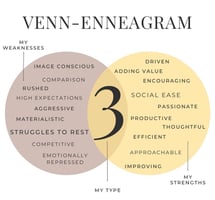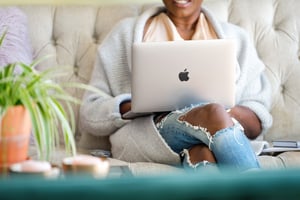Enhancing Interpersonal Connections The Enneagram is a powerful tool for understanding personality...
The Enneagram and Christianity: Myths, Truths, and Growth
 Have you ever felt conflicted about who you are, or wondered why certain struggles keep showing up in your life? Perhaps you’ve heard of the Enneagram—a tool that claims to reveal deeper motivations behind your thoughts and behaviors—but you’re unsure whether it aligns with your faith as a Christian. If so, you’re not alone. Many believers experience a mixture of curiosity, skepticism, and even fear when approaching the Enneagram. In this article, we’ll explore the information shared in a recent video about the Enneagram and Christianity, debunk three common myths, and show how this tool can foster self-awareness and spiritual growth. Along the way, we’ll also acknowledge the very real feelings of doubt and longing that many people face, offering reassurance that God meets us in our questions and struggles.
Have you ever felt conflicted about who you are, or wondered why certain struggles keep showing up in your life? Perhaps you’ve heard of the Enneagram—a tool that claims to reveal deeper motivations behind your thoughts and behaviors—but you’re unsure whether it aligns with your faith as a Christian. If so, you’re not alone. Many believers experience a mixture of curiosity, skepticism, and even fear when approaching the Enneagram. In this article, we’ll explore the information shared in a recent video about the Enneagram and Christianity, debunk three common myths, and show how this tool can foster self-awareness and spiritual growth. Along the way, we’ll also acknowledge the very real feelings of doubt and longing that many people face, offering reassurance that God meets us in our questions and struggles.
Facing Our Feelings and Finding Validation
Before we dive into the Enneagram’s background, it’s important to acknowledge the feelings that often arise when we talk about something new or unfamiliar. You might feel confused by conflicting opinions: some say the Enneagram is helpful, others claim it’s dangerous. You might feel anxious, worried that using this tool could conflict with your faith. Or maybe you’re hopeful, sensing that the Enneagram could be just what you need to understand yourself and others better. Whatever you’re feeling, it’s valid. God created you with emotions, and those emotions can guide you toward deeper questions and growth.
It’s natural to wrestle with doubt or uncertainty, especially if you’ve been told that Christians should rely on the Bible alone for self-knowledge. The good news is that seeking understanding—about who you are, how you relate to others, and how you connect with God—doesn’t mean you’re abandoning Scripture. In fact, Scripture often invites us to “search our hearts” (Psalm 139:23–24), and it reassures us that God can handle our questions (James 1:5). You don’t have to face this exploration alone, nor do you have to ignore your concerns. With God’s guidance, you can balance both faith and discernment as you evaluate the Enneagram.
What Is the Enneagram, and Where Did It Come From?
 The Enneagram is a personality typing system that identifies nine core types, each with its own motivations, fears, and desires. Unlike other personality frameworks, it’s not just about behaviors—it dives deep into why we do what we do.
The Enneagram is a personality typing system that identifies nine core types, each with its own motivations, fears, and desires. Unlike other personality frameworks, it’s not just about behaviors—it dives deep into why we do what we do.
While its symbol—a nine-pointed geometric figure—has ancient origins in sacred geometry and numerology, the Enneagram as a personality tool was developed in the 20th century. Figures like Oscar Ichazo and Claudio Naranjoconnected the symbol to human psychology, creating a system to help people recognize patterns and grow.
Despite its modern usage, some Christians worry about its associations with esotericism or mysticism. It’s important to note that while some have added New Age ideas to the Enneagram, it is not a religion or a comprehensive belief system. Instead, it’s often described as a neutral tool—much like a map—that helps reveal each person’s core motivations, fears, and desires. The question, then, isn’t whether the map itself is “good” or “bad,” but how it’s used.
Myth #1: The Enneagram Is New Age or Occultic
If you’ve ever Googled the Enneagram, you might have stumbled on articles calling it New Age, or even accusing it of being connected to the occult. This can understandably provoke fear and confusion. However, the main reason for these concerns is that some teachers who embraced the Enneagram also mixed in New Age ideas—something that can happen with many psychological or spiritual tools.
But just because a tool has been misused by some doesn’t make it inherently evil or occultic. Think of the Enneagram like a hammer: it can build something beneficial or cause harm, depending on who’s wielding it and why. When Christians approach the Enneagram with biblical discernment, it becomes a way to recognize unhealthy patterns, examine our hearts, and grow closer to God.
Myth #2: The Enneagram Is Unbiblical
Another common misconception is that the Enneagram is incompatible with Scripture. Yet Christians have long used various tools—like devotionals, personality assessments, counseling techniques—that aren’t mentioned in Scripture but still support spiritual growth.
Psalm 139:23-24 says, “Search me, O God, and know my heart; test me and know my anxious thoughts. See if there is any offensive way in me, and lead me in the way everlasting.” This **implies a willingness to look inward. The Enneagram aids in this self-reflection by highlighting core sins (like pride, fear, or envy) and guiding you toward recognizing them. It’s not meant to replace the Bible; it’s a companion that can spotlight the areas of your life where Scripture’s truth can bring healing and change.
The Enneagram helps us do exactly that. By identifying the core fears and desires that drive us, we can recognize where we fall short and bring those struggles to God. For example:
- A Type 3 (The Achiever) might realize they’re idolizing success and find peace in trusting their worth to God.
- A Type 6 (The Loyalist) might see how fear has controlled their decisions and learn to rest in God’s sovereignty.
It’s not about replacing Scripture but using the Enneagram as a mirror to reflect the truth of God’s Word more clearly in our lives.
Myth #3: The Enneagram Puts You in a Box
It’s natural to resist the idea of being labeled or boxed in. Perhaps you feel defensive, worried that the Enneagram is going to reduce you to a “type” and ignore the complexity of your life story. In reality, the Enneagram doesn’t limit you—it exposes the box you may already be living in. It reveals habitual patterns, unconscious fears, and hidden desires that shape your responses to the world.
By understanding your primary Enneagram type, you gain language for what drives you. This awareness isn’t meant to trap you; instead, it can lead to freedom as you learn to navigate your weaknesses and embrace your gifts. For instance, a Type 2 (The Helper) might discover how their giving spirit sometimes morphs into seeking approval. Recognizing this pattern lets them surrender it to Christ and serve others with a more genuine, God-centered love.
How the Enneagram Can Help Christians
 Beyond debunking myths, the Enneagram is a powerful tool for spiritual growth, relationship building, and self-awareness. Here’s how it can help you as a follower of Christ:
Beyond debunking myths, the Enneagram is a powerful tool for spiritual growth, relationship building, and self-awareness. Here’s how it can help you as a follower of Christ:
1. To Understand Your God-Given Identity
Psalm 139:14 reminds us that we are uniquely and wonderfully made. Each Enneagram type reflects a different aspect of God’s character:
- A Type 4 (The Individualist) mirrors God’s creativity.
- A Type 9 (The Peacemaker) reflects His desire for unity.
By understanding your type, you can embrace the unique way God designed you and use your strengths to serve His Kingdom.
2. To Identify Sin Patterns
Each type has a “core sin” that can become a stumbling block—pride, fear, envy, or anger, to name a few. Recognizing these patterns helps us bring them to the cross and rely on God’s grace to transform us. Romans 7:15 speaks to this struggle: “I do not do what I want, but I do the very thing I hate.”
The Enneagram sheds light on these struggles, helping us name them and surrender them to Christ.
3. To Practice Grace Toward Others
Relationships can be challenging when we don’t understand where others are coming from. The Enneagram reminds us that everyone sees the world differently.
- A Type 1 might criticize because they genuinely want to help improve something.
- A Type 7 might avoid hard conversations because they fear losing their joy.
When we understand these motivations, it becomes easier to extend grace and build stronger, healthier relationships. Ephesians 4:2 calls us to “be patient, bearing with one another in love.” The Enneagram helps us live out this call by fostering empathy and compassion.
You’re Not Alone in This Journey
It’s normal to wrestle with questions about who you are, why you struggle, and how to grow closer to God. The Enneagram is not a magic fix or a substitute for Scripture—it’s a tool to help you see yourself and others more clearly.
If you feel stuck in patterns of fear, anger, or self-doubt, know that you’re not alone. Every Christian faces struggles, and every journey toward growth begins with a single step of self-awareness. The Enneagram can be one step in that process, helping you uncover the places where God’s transformative grace is most needed. You can also check out my YouTube channel for more faith content.
Remember, no matter your type, your worth and identity are found in Christ alone. As you explore the Enneagram, let it point you back to Him—the one who knows you fully and loves you completely.

Feel encouraged? Let this be a starting point for deeper reflection, prayer, and growth. You’re not alone, and you are wonderfully made.
I’ve created a free 44-page ebook called Using The Enneagram for Spiritual Growth.
This ebook will help guide you toward clarity and alignment. Register at the link in the description box



